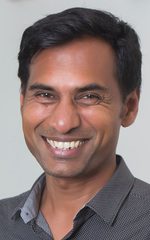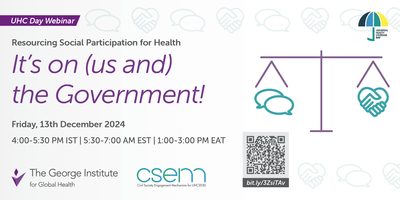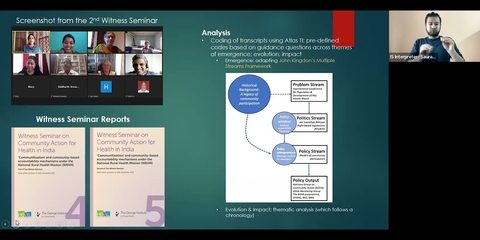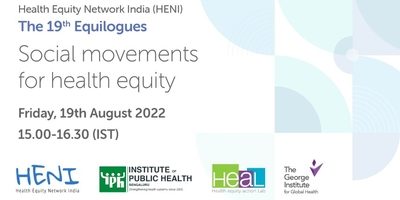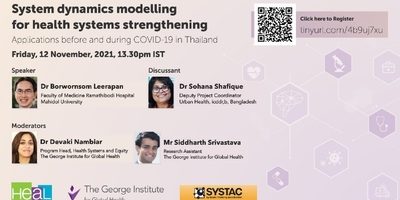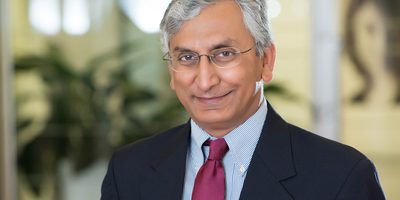
How do we build the world we want? Multi-Country Perspectives on Social Participation for Universal Health Coverage
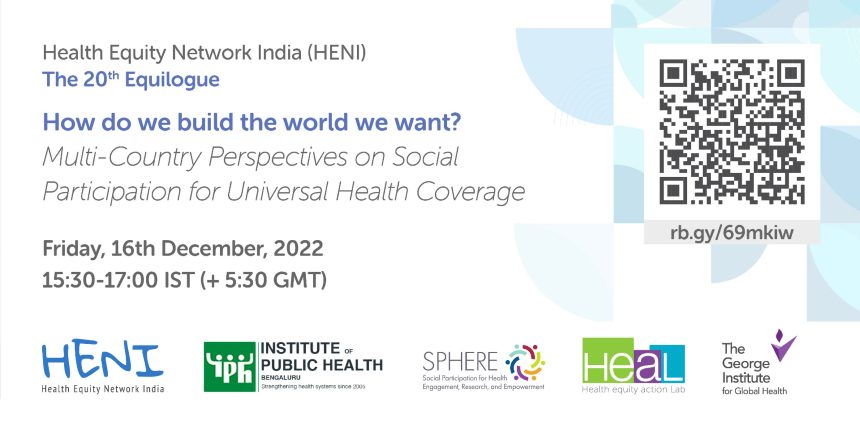
Social participation or citizen engagement has become an integral part of health systems strengthening since its rise in prominence as part of the Alma Ata declaration on “Health for All” in 1978. Evidence linking social participation to improve health outcomes and health systems is emerging and acting as a critical tool for advocacy around the policy imperative for governments to institutionalize and strengthen social participation as part of health programs. History bears testimony to the central role that the civil society has been playing in advocating for and facilitating citizen engagement in health. There have been numerous attempts globally at institutionalising and operationalising citizen engagement in health programs. Several of these experiences in countries have been documented whereas for many such documentation is emerging.
Mark your calendars for 16th December 2022 | Friday | 1530-1700 IST
About the Equilogues
The Civil Society Engagement Mechanism (CSEM) for UHC2030 is partnering with The George Institute for Global Health as part of a project entitled “Social Participation for Health: Engagement, Research, and Empowerment (SPHERE)” to document experiences of social participation and community action in health and support advocacy efforts of civil society partners in Argentina, Vietnam and Kenya towards advancing citizen engagement and social participation for health linking up to UHC. With Universal Health Coverage (UHC) occupying the central stage in policy and advocacy related to health systems governance and the delivery of health services, such documentation offers lessons and opportunities for cross-learning on how social participation could be leveraged for progressively achieving UHC.
The 20th Equilogue of the Health Equity Network India (HENI) will bring together researchers and practitioners who – based on their involvement in research, advocacy, and action related to citizen engagement – will share perspectives, learnings, challenges, and the way forward for Social Participation for health (SPH) in their country contexts and deliberate on the role of SPH within the UHC discourse.
Format: The webinar will begin with a team from The George Institute for Global Health India showcasing its documentation work on the history of institutionalising community participation and action in health under India’s National Health Rural Mission (NRHM) using the oral history methodology of a Witness Seminar.
This will be followed by a fireside chat hosted by Dr David Peiris from The George Institute with representatives from the civil society deeply involved with work encompassing social participation and movement-building on UHC and strengthening community led action for health reform.
Speakers
Hari Sankar
Research Fellow, Health Systems and Equity, The George Institute for Global Health, India
Dr Hari Sankar D is a qualitative research fellow at the George Institute for Global Health India. He has a Master’s in public health and a Bachelor’s degree in Ayurveda. He has worked for more than six years in health systems and operation research focusing on primary health care. He is trained in disease surveillance and later gained field experience in implementation research. His current research interest is focused on developing a monitoring framework for tracking health system performance indicators and underlying inequalities in the health system of Kerala.
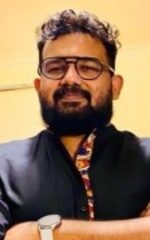
Misimi Kakoti
Research Officer, The George Institute for Global Health, India
Misimi Kakoti is currently working as a Research Officer (RO) at The George Institute, India. Her research interests lie in the intersection of gender, rights, and equity in health policy and systems. She has been primarily involved with the documentation work on community action in health in India with the method of Witness Seminar, piloting the 8Quity checklist tool, and the CEDAW implementation review project at TGI. She has previously worked with the Rapid Evidence Synthesis Unit at The George Institute. She also supports the Secretariat of the Health Equity Network India (HENI). Prior to this, she has worked with the Tata Institute of Social Sciences and ActionAid India.

Abhijit Das
Founder and Managing Trustee, Centre for Health and Social Justice, India
Dr Abhijit Das is the Founder and Managing Trustee of the Centre for Health and Social Justice, a policy research and advocacy institution on health and human rights, and gender equality. Dr Abhijit is a medical doctor with 35 years of experience in grassroots work, training, research and policy advocacy in the field of public health. He is the founder member of MenEngage, a global alliance of NGOs working with men and boys on gender equality, and Co-Convenor of COPASAH (Community of Practitioners on Accountability and Social Action in Health), a global health rights and social accountability network, and member of the Advisory Group on Community Action (AGCA). He is Clinical Associate Professor, Department of Global Health, University of Washington.
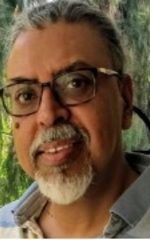
Smitha Sadasivan
Disability Rights Practitioner
Smitha Sadasivan is a social activist passionate about accessibility and inclusivity of persons with disabilities at all domains including civil political socio cultural, financial legal and administrative contexts. She is a member of the Civil Society Engagement Mechanism for UHC 2030, while also serving on the Steering Committee of the UHC 2030 initiative overall. In her native state of Tamil Nadu, she serves on the State Advisory Board for Persons with Disabilities under the Rights of Persons with Disabilities, the Disability Rights Alliance. At the national level, she is a member of the Multiple Sclerosis Society of India and the Election Commission. Smitha has degrees in English Literature and Psychology.
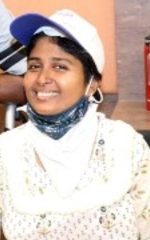
Nguyen Thuy Linh
Deputy Director, Center for Supporting Community Development Initiatives (SCDI), Vietnam
The Centre for Supporting Community Development Initiatives (SCDI) is a Vietnamese NGO, well-known for its leading role in advocacy for marginalized populations’ access to health and fostering national networks of key populations and other community networks in Vietnam.
In 2015, Linh joined SCDI to develop the Children and Youth program, and has led various interventions and advocacy efforts on drug harm reduction and HIV prevention for young drug users, sexual and reproductive health and rights for young women and adolescent girls, building resilience, increasing access to health and education for disenfranchised children. She also provides supervision for Harm reduction and Addiction Treatment program and the Communication and Social Mobilization team.
Before SCDI, Linh sat in the core team laying the stepping stones for the first Global Fund supported project on HIV/AIDS led by civil society in Vietnam, facilitating capacity building of community-based organizations and key populations networks and their engagement in advocacy for enabling environment for civil society participation in the HIV response.
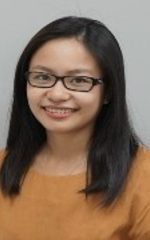
Justin Koonin
Co-Chair, UHC2030 Steering Committee; President, AIDS Council of New South Wales
Justin is co-chair of the Steering Committee of UHC2030, the international multi-stakeholder partnership for universal health coverage, and is a member of multiple WHO expert panels. At a national level, Justin is president of ACON (AIDS Council of New South Wales), Australia’s largest community organisation dedicated to HIV/AIDS prevention, care and support, as well as to the health of sexuality and gender diverse people more broadly. He is Distinguished Fellow and Honorary Professorial Fellow at The George Institute and Adjunct Associate Professor in the Faculty of Medicine and Health at the University of New South Wales, as well as a Fellow of the Australian Institute of Company Directors. Justin's training is in the field of pure mathematics, and he currently works as an investment analyst.
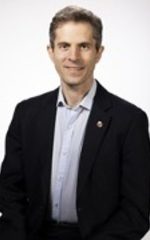
David Peiris - Fireside chat host
Director, Global Primary Health Care Program; Co-Director, Centre for Health Systems Science, The George Institute for Global Health
David is Director of the Global Primary Health Care Program (Better Care) and Co-Director of the Centre for Health Systems Science.
He is a Professor in the Faculty of Medicine, UNSW Sydney and works clinically as a GP in Sydney. David joined the Institute in 2006 and leads the Better care program at the Institute. This program focusses on SDG 3 - especially SDGs 3.4 and 3.8. The goal is to overcome the challenges of delivering affordable, high-quality health services and programs to communities across the globe. It is underpinned by health systems science, a dynamic and emerging discipline that includes health services research, health policy and systems research and implementation science. David has published extensively in areas related to health systems research and leads several grants testing innovative strategies to improve access to high-quality primary health care with a particular focus on under-served populations. He was the 2015-2016 Australian Harkness Fellow in Healthcare policy, based at Harvard School of Public Health where he conducted a national study of the changes to health care delivery systems associated with President Obama's reforms. He has been a board member with the Royal Australian College of General Practitioners National Faculty of Aboriginal and Torres Strait Islander Health and sits on several government, non-government and research advisory committees. He was the elected co-chair of the Global Alliance for Chronic Diseases committee for hypertension control from 2012 to 2015.
